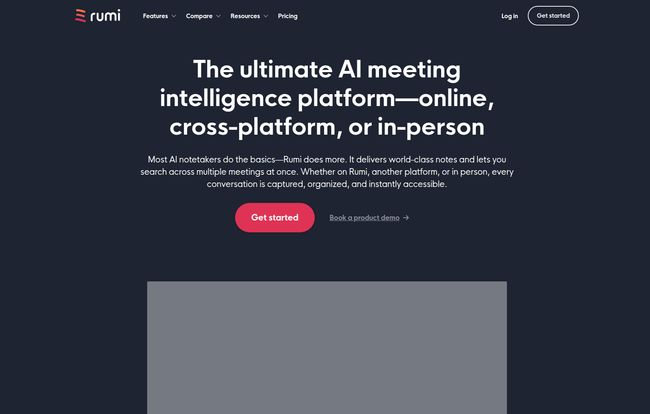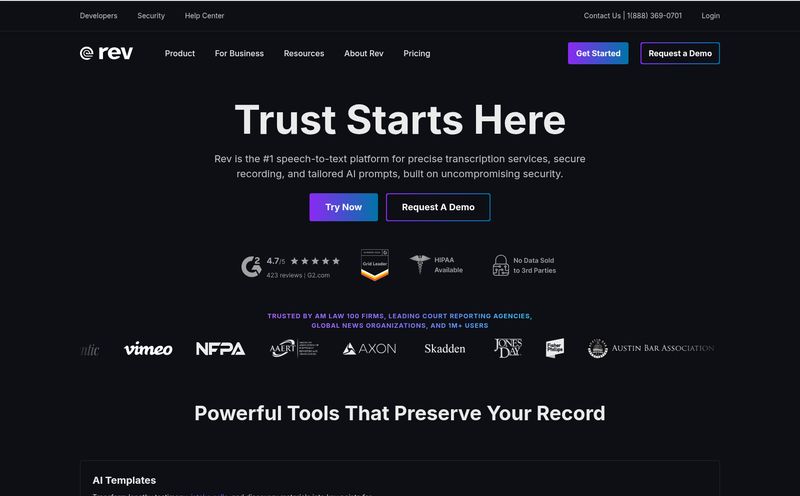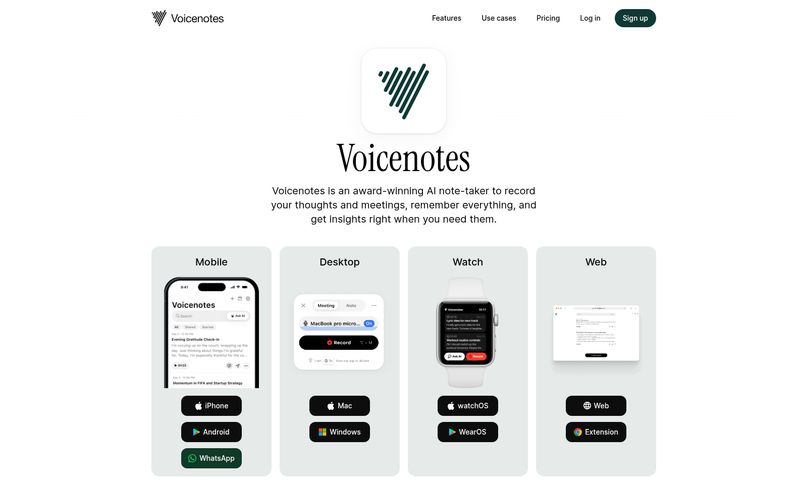You get a meeting invite on your calendar and your heart sinks just a little bit, doesn't it? Another hour that could have been an email. Another session where one person talks for 45 minutes straight while everyone else discreetly checks their phone. I've been in the SEO and digital marketing game for years, and if there's one constant across every industry, it's the universal dread of a poorly run meeting.
We've tried everything. Agendas, no-meeting Fridays, designated note-takers. Yet, we still end up in the same unproductive loop. So when a tool like Rumi comes along, claiming to be the "ultimate AI meeting intelligence platform," my professional skepticism kicks in. Hard. But so does my curiosity. Is this just another glorified transcription service, or is it something... more?
I spent some time digging into what Rumi is all about, and what I found was genuinely intriguing. It’s not just about recording what was said; it's about actively shaping the conversation as it happens.
So, What Exactly is This Rumi Thing?
Think of Rumi not as a stenographer, but as a digital meeting facilitator. A moderator in a box. It’s an AI-powered assistant designed to integrate with the meeting platforms you already use (you know the ones) and bring a layer of structure and, dare I say, sanity to the process. The whole pitch is to move beyond just documenting meetings and start actively improving them in real-time.
The core problem Rumi is trying to solve is a deeply human one. It’s the tendency for conversations to meander, for the loudest voices to dominate, and for brilliant ideas or crucial action items to vanish into the ether the second the “End Meeting” button is clicked. Rumi wants to be the safety net for all that lost potential.
The Features That Actually Made Me Pay Attention
Okay, so it talks a big game. But what does it do? I’ve seen a million and one “AI productivity tools,” and most are just shiny wrappers on a basic API. Rumi, however, has a few tricks up its sleeve that feel different.
The Gentle Tyranny of the Clock: Time-Boxed Speaking
This is the one that first caught my eye. Rumi can implement time-boxed speaking. We’ve all been in that meeting with ‘that guy’—the one who hijacks the agenda and monologues for twenty minutes. This feature gives everyone a turn and a set amount of time to speak. It’s a simple concept, but enforcing it without an impartial, non-human referee is socially awkward. Having an AI manage the speaking clock democratizes the conversation. It ensures the introverts and deep thinkers get their say, not just the extroverts. Finally.
Permission to Go Off-Camera
Zoom fatigue is real. I’ve seen the studies, and I’ve felt it in my bones. The pressure to be “on” and performatively engaged for hours on end is draining. Rumi explicitly offers off-camera listening capabilities. This isn't just about turning your camera off; it’s about creating a culture where it’s okay to do so because the AI is helping you stay tuned in. It lowers the cognitive load, allowing you to actually listen and think instead of worrying about if you're nodding convincingly enough. A small change with massive quality-of-life implications.

Visit Rumi
The Real Star: Meeting Memory™
This, for me, is the absolute game-changer. Rumi has a feature they call Meeting Memory™. It’s not just a transcript. It’s an intelligent, searchable knowledge base built from the raw material of your team’s conversations. According to one of the testimonials on their site from a Director of Corporate Marketing, it’s “incredible.” And I believe it.
Think about it. Every decision, every objection, every action item, every spark of a new idea—it's all captured, analyzed, and made accessible. It’s like having a perfect, collective memory for your entire team or company. No more “Who agreed to do that?” or “What did we decide about the Q3 budget last month?” You can just… ask. This transforms a meeting from a one-time event into a permanent, valuable asset. For content strategy and internal knowledge management, the value here is immense.
But is My Super Secret Meeting Data Safe?
Whenever you pipe your company’s internal discussions through a third-party tool, security has to be top of mind. It’s a question I ask constantly. It looks like the Rumi team gets this. They specifically mention that meetings are secure and private, touting 256-bit AES & SSL/TLS encryption. This is the industry standard for securing data in transit and at rest, the same level of encryption used by banks and governments. So, while you should always do your own due diligence, it's a good sign that they're addressing this head-on.
The Million-Dollar Question: What's the Price of Rumi?
And here we hit the one snag I found. As of my review, the pricing page on Rumi's website is unavailable. This is a bit of a bummer. It’s a common move for startups in beta or those wanting to funnel you into a sales call, but it does make a quick evaluation tricky.
So, what can we expect? My educated guess is we’ll see a tiered model, probably a per-user/per-month fee with different levels of features. A free tier with basic capabilities to get you hooked, a pro tier for power users and small teams, and an enterprise plan with all the bells, whistles, and security assurances. But for now, the cost remains a mystery. You'll have to reach out to them directly for a quote.
My Final Take as a Pro Blogger
So, is Rumi the real deal? In my opinion, it has a serious shot. It's tackling a real, persistent problem with a thoughtful set of features. It’s not just about tech for tech’s sake; it’s about improving the human dynamics of collaboration.
While the time-boxing and off-camera modes are great for meeting quality, I keep coming back to the Meeting Memory™. The ability to build an intelligent, queryable history of your team's knowledge is incredibly powerful. It's a single source of truth that builds itself. That alone could justify the (currently unknown) price for many organizations struggling with knowledge silos.
There will probably be a bit of a learning curve, and its effectiveness will hinge on how smart the AI actually is. But the concept is sound. I'm genuinely excited to see how tools like Rumi evolve. They represent a shift from passive data capture to active intelligence augmentation, and that's a trend worth watching.
Frequently Asked Questions about Rumi
- What makes Rumi different from Zoom's or Google Meet's built-in AI features?
- While platforms like Zoom and Google Meet are adding AI summaries, Rumi is designed to be a more active participant and facilitator. Features like time-boxed speaking and the comprehensive, searchable 'Meeting Memory™' go beyond simple summarization to fundamentally change meeting structure and create a lasting knowledge asset.
- Can I use Rumi for in-person or hybrid meetings?
- The platform is primarily designed for remote meetings where everyone is on a platform like Zoom or Teams. However, the core principles could theoretically be applied to a hybrid setting, as long as the audio from the room can be clearly captured by the service.
- Does Rumi completely replace the need for a human note-taker?
- For capturing action items, decisions, and key moments, yes, it largely can. The Meeting Memory feature is designed to do this automatically. However, a human note-taker might still be valuable for capturing nuanced context or specific team conventions that an AI might initially miss.
- How does the AI handle different accents or technical jargon?
- The effectiveness of any AI transcription and analysis tool depends on its training data. While modern AI has gotten very good with various accents and industry-specific language, there can sometimes be errors. The quality of its transcription will directly impact the quality of the insights in the Meeting Memory.
Time To Reshape Your Meeting Culture?
At the end of the day, a tool is only as good as the team that uses it. Rumi isn't a magic wand that will instantly fix a toxic meeting culture. But it does seem to be a powerful ally. It provides the structure and data to hold ourselves accountable, to make sure every voice is heard, and to ensure that the valuable time we spend talking to each other actually leads to something tangible. And in the world of endless meetings, that sounds pretty good to me.
Reference and Sources
- Rumi Official Website - All information and testimonials were sourced directly from the platform's homepage.



